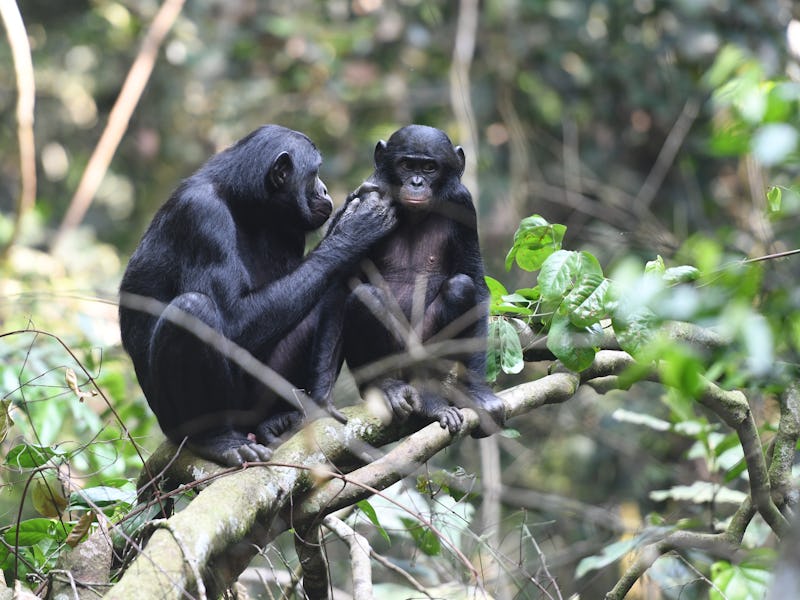Moms of Other Species Pressure Their Kids Into Having Grandchildren, Too
“I just wondered, ‘What is it of their business?’”

Match-making mothers have meddled, for better or for worse, throughout human history. The innocent suggestion, “I know someone you might like,” can turn into a one-two punch when it’s followed by the pointed question, “When am I going to get grandchildren?” But we have it easy. In the world of bonobos, mothers don’t bother with any subtlety, according to a study released Monday in Current Biology.
Martin Surbeck, Ph.D., the study’s first author, is a research group leader at the Max Planck Institute for Evolutionary Anthropology. He tells Inverse that while spending time living with wild bonobos, he began to observe something odd. Females were behaving like males during competition over other females. When the males tried to copulate, some females would become aggressive and do their best to interfere.
“I just wondered, ‘What is it of their business?’” Surbeck recalls. “This all made more sense once we found out via genetic analysis that they were mothers of some of the adult males involved.”
In other words, mothers were doing what they could to help their sons get laid. In turn, by ensuring reproductive success, a bonobo mother impacts the male’s fertility and helps continue their genetic line.
Genetically speaking, they are the human's closest relative along with chimpanzees.
Further observation of the wild bonobos in the Democratic Republic of Congo revealed that the mothers helped their sons in both active and passive ways. There was the fighting, which involved supporting their sons in quarrels over male rank and fending off males while their sons tried to mate. Other actions were even more direct, with mothers bringing their sons into close spatial proximity with females in heat.
There were also more courtly schemes going on. Bonobo mothers used their high ranking to give their sons popular spots within the social group, lending them clout that meant better mating opportunities. Because bonobos live in matriarchal societies, a leg up from mom can mean a lot.
Furthermore, this meddling pays off. The team calculated that bonobos who lived in close proximation to their mothers were about three times more likely to sire offspring than males who did not.
“In the end, it was surprising to see such a strong effect of the presence of mothers on a trait that is a very important component of male fitness,” Surbeck says. “We know that mums influence longevity, but the finding that they actually influence such a fitness relevant measurement was surprising.”
To determine whether this was a beneficial relationship unique to bonobos, the scientists also observed the role mothers play in wild chimpanzee populations in Côte d’Ivoire, Tanzania, and Uganda. They found that, while chimp mothers tried to help their sons, they were less effective than their bonobo peers. Instead, male chimps who had a mother present when they tried to put on the moves were actually 1.26 times less likely to sire offspring. Surbeck hypothesizes this is because females are subordinate to males in chimp communities unlike in bonobo communities.
Chimpanzee moms weren't as helpful as bonobo moms when it came to helping their sons find reproductive success.
Now, the over-arching question is: What do bonobo moms get out of this?
One idea is that they evolved to perform these actions because they indirectly help continue their genes — females can increase their reproductive success without actually having more babies.
Surbeck questions whether this might link back to something called the “grandmother hypothesis,” which is used to explain why human women live long enough to reach menopause. The idea is that women’s long lifespans make evolutionary sense because they help their daughters raise offspring and free up their time to have more children.
That theory is still a topic of debate, but it’s possible that bonobo mothers are also gaining an “indirect fitness benefit” by helping their sons have offspring. Importantly, the team only saw bonobo mothers helping sons, not daughters: In their social system, daughters leave the native community, while sons stay. When those daughters leave, they encounter a different sort of female support — a close beneficial alliance with the females who run their new home.
Abstract:
In many group-living mammals, mothers may increase the reproductive success of their daughters even after they are nutritionally independent and fully grown. However, whether such maternal effects exist for adult sons is largely unknown. Here we show that males have higher paternity success when their mother is living in the group at the time of the offspring’s conception in bonobos (N = 39 paternities from 4 groups) but not in chimpanzees (N = 263 paternities from 7 groups). These results are consistent with previous research showing a stronger role of mothers (and females more generally) in bonobo than chimpanzee societies.